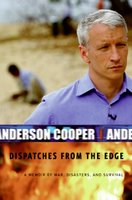 I just finished reading Anderson Cooper's New York Times bestseller Dispatches from the Edge: A Memoir of War, Disasters and Survival and I'm impressed. It's not a title I would normally pick-up and it's certainly not something I would expect to finish in two days but that's a testament to the book itself.
I just finished reading Anderson Cooper's New York Times bestseller Dispatches from the Edge: A Memoir of War, Disasters and Survival and I'm impressed. It's not a title I would normally pick-up and it's certainly not something I would expect to finish in two days but that's a testament to the book itself.For me it started with a photograph. On the cover of the June 2006 issue of Vanity Fair there's a photograph that stopped me in my tracks. It's a close-up of a man, Anderson Cooper as it turns out, and he's not crying but you can see the water beginning to pool in the corners of his eyes. I stood there thinking "how in the world did they get that shot?". I bought the magazine and the article turned out to be an excerpt from Cooper's book. Having now read both I don't imagine that it was so hard for him to find something sad to think about.
If you do a little research on Anderson Cooper you'll quickly learn 4 basic things about him: his mother is a Vanderbilt, his father died when he was 10, his brother committed suicide 12 years later and he has some very strange, albeit committed, fans. Oh and he also has this day job where he's an anchor for CNN. Since when do CNN anchors have fans?
The interviews all seem to focus in on the sadness. In the book Cooper himself admits that he started going to wars and disasters because it was more comfortable to be where other people were hurting but I am surprised that so many of the interviews focus on just this one aspect. Time Magazine's Andrea Sachs sat down for 10 Questions with Anderson Cooper for this week's issue. I would have expected something a little better than "when did you realize your Mom was famous?" and "how did you feel when your father died". Maybe it's easier to stick to the script.
I don't know if I'd say that I enjoyed the book -- famine, war, tsunamis and hurricanes are hardly fun topics. But here at the end of it, I'm glad I read it. Cooper often speaks of trying to get people to remember what happened, to not forget, and reading the book is one way to do that. It's hard to wrap your head around suffering on the scale he has seen time and again but his writing style helps take you there. I got the feeling from time to time that he was holding back, but perhaps that was for my benefit as a reader. Throughout the book he talks about the ways people try to deal with tragedy -- soldiers, aid workers, reporters -- and I wonder if he had to edit himself a bit for those of us who haven't been there.
If I had a criticism of the book it would be this: pick a verb tense. Memoirs, traditionally, are written in past tense and this one keeps flicking back and forth between past and present tense. Maybe for a journalist who lives in telling stories that are happening now asking him to abandon present tense was too much to ask. Maybe it's so ingrained it's just part of how he tells the story.
It's a good book, I'd recommend it. Fair warning: this is not a book you curl up in bed with. I have a feeling it will also prove to be a book that stays with me. There are photos in the hard cover edition but mercifully they're mostly family shots and not field shots. The field shots have definitely been chosen carefully. There's one of Cooper sitting in the remains of a hotel in Sri Lanka mud and refuse and Christmas decorations still hanging from the ceiling. But given the stories, it's relatively clean.
It's been interesting reading some of his other articles. There is a levity and humour in them that isn't in the book. It would have been out of place in the book to be sure, but it's good to know that it's in there. I'm glad he didn't leave it behind in the field somewhere.
There's more to say, but I think it's another post.


1 comment:
I'm a fan of Anderson Cooper. There's just something about him, he seems very real. Thanks for the recap of the book.
Post a Comment